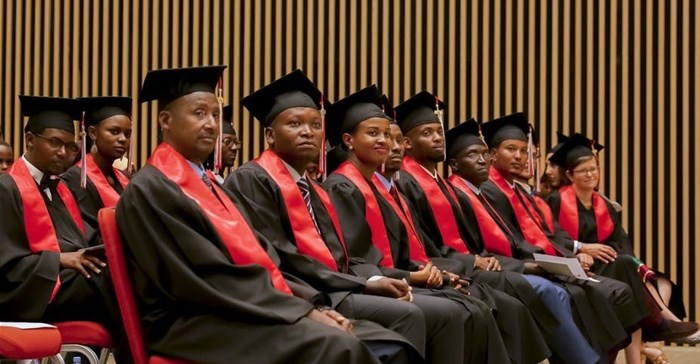Rwanda university sets out to teach doctors medicine and management

Why does Africa have a shortage in health professionals?
Africa isn’t the only part of the world with a shortage of health professionals, but it has a very high disease burden, with a very low percentage of the global workforce. This means that the shortage is more acute.
We have a lack of doctors and nurses, but also a lack of specialists like paediatricians, psychologists, surgeons, oncologists, and physiotherapists. Additionally, there are forms of care that are not well developed on the continent yet, like geriatrics and neonatal care.
There are many reasons for this. One major reason is that there aren’t enough institutions or teachers to train them. Per capita, Africa produces fewer doctors than any other part of the world.
The current level of socioeconomic development is one of the reasons for the lack of institutions. For instance, in Rwanda, during the colonial time period, no universities were producing doctors and we can now see the results of that delay. In 1963, the first university was set up, but it took about seven years before it graduated its first class.
Getting an education abroad was very expensive for families. And if students did go abroad, the type of medical education they received might not have suited the African context – for instance, they may be educated in diseases that are not the most important for our environment and acquire skills that are not suited to the needs of their home context.
Another important problem that contributes to the shortage of doctors is brain drain. Many health professionals leave Africa to work in other parts of the world, and developed countries take them at no cost. This further slows Africa’s socioeconomic growth. As it is, we don’t produce enough compared to other continents, and many health professionals then leave the continent to got to countries like the US or Middle East. This results in a loss of health services, human development investment, supervisors, and mentors.
The shortage, of course, is felt more in some areas than others. It’s also felt more acutely after unrest or epidemics.
What additional skills do medical professionals need in African countries?
In the developed world, the doctor goes into his or her clinic in the morning, works through his or her patient list or appointments, and then leaves at the end of the day. There are people to manage the hospital, order the drugs and equipment, organise the maintenance of equipment and the improvement of the infrastructure.
But in many African settings, doctors need to know how to manage all of this. They need to have managerial skills that can contribute to building the system in which they will perform. In addition to these skills, they also should know how to equip systems for epidemic outbreaks, how to prevent diseases they might face, and how to be better equipped to cure these diseases because drugs and equipment take longer to reach their hospitals than hospitals in the developed world. These extra skills are essential for our doctors and nurses, and this is what we teach at the University of Global Health Equity.
Clinicians also must build systems with task-shifting ingrained in them. For example, if you have someone with malaria, there’s no need to go to a health facility. You can have trained community health workers, monitored by a health professionals, to diagnose and treat malaria. Most cases aren’t complicated. And, if the case is complicated, they can be transferred to health facilities. This is a system that won’t overuse the skills of doctors and nurses.
How will the university address these challenges?
The University of Global Health Equity will educate health professionals with the extra skills that they need, including managerial and leadership skills. They will also have a better understanding of the social determinants of health – for instance understanding that where people live may be causing an illness and addressing it – and all the principles of building a health system that ensures everyone can access services.
All our clinicians graduates will have a dual degree when they leave the university. They will be medical doctors and they will have a Masters in Global Health Delivery. That means they have a masters in building systems, doing quality research, training, and doing advocacy for the provision of better care.
This will help address issues of brain drain. Many health professionals leave the continent because they don’t know how to handle the non-clinical systemic problems in the health sector and don’t have the skills to be part of their solution. This means they may be discouraged and go somewhere where it’s easier to work. But with the capacity to build the system to exercise their skills, health professionals will be more inclined to stay.
Our institution will also support students after they graduate. We have a system that allows us to follow our alumni closely. They come back to us if they have questions, if they have a problem that is new for them, or if we can help them create connections. That also helps them sustain their stay wherever they are.
This article is republished from The Conversation under a Creative Commons license. Read the original article.![]()
Source: The Conversation Africa

The Conversation Africa is an independent source of news and views from the academic and research community. Its aim is to promote better understanding of current affairs and complex issues, and allow for a better quality of public discourse and conversation.
Go to: https://theconversation.com/africa









